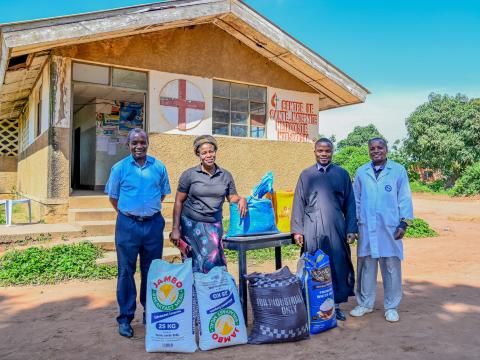DR Congo: Innovations Recorded in the Fight Against Malnutrition in Maisha and Mutshatsha 1

By Tatiana Ballay, Communications Officer
Faced with child malnutrition threatening children's future in rural areas of Lualaba Province in southern DRC, the Maisha and Mutshatsha 1 health zones are implementing innovative initiatives. In this context marked by extreme poverty, limited social infrastructure, and a semi-arid climate with a prolonged dry season that reduces agricultural yields and restricts access to a varied diet, community mobilization and the strengthening of local capacities have proven essential in providing a sustainable response to this nutritional crisis.
The Nutritional Crisis: A Wake-Up Call
In November 2024, a nutritional survey conducted in the Maisha and Mutshatsha 1 zones revealed an alarming situation, with 93 cases of severe malnutrition out of 239 children surveyed.
Jean-Paul Kawangu Iswamo, community facilitator in charge of the health zone, explains:
“The lack of awareness of balanced dietary practices, low rates of exclusive breastfeeding, and the scarcity of essential food products all contribute to worsening the situation. That’s why an urgent intervention is necessary to prevent serious complications and reduce the risk of child mortality.”
To meet the population's needs, a Positive Deviance Hearth (PD Hearth) committee was formed. This committee plays a strategic role in coordinating awareness activities, fundraising, and monitoring vulnerable children. The PD Hearth committee is composed of a multidisciplinary team that ensures both transparent management and effective response to local needs. Committee members are selected based on specific criteria to ensure their commitment, credibility, and ability to drive lasting change.
Funding and Monitoring of PD Hearth Sessions
In addition to local contributions, the program benefits from institutional support and strategic partnerships that enhance its sustainability. These partners include sponsorship structures, the well management committee, and the health zone, which provide essential technical and financial support. This collaboration ensures steady funding and strengthens ongoing efforts to guarantee the program’s long-term continuity and effectiveness.
Structure of Sessions and Child Follow-Up
When a child is identified as malnourished and declared eligible for the PD Hearth sessions, a structured care process is immediately initiated. It begins with an intensive twelve-day phase during which caregivers and parents receive in-depth training on nutrition, hygiene, and healthcare. This intervention is followed by strengthened community support, with home visits carried out by volunteers two to three times a week for two weeks after the session. To ensure sustainable improvements in the child’s nutritional status, follow-up checks are conducted at three months, six months, and, if possible, up to one year. These checkpoints help assess the impact of the measures taken and adjust interventions if necessary.
Challenges Faced and Adaptation Strategies
Implementing PD Hearth sessions comes with several major challenges that limit the scope and effectiveness of the intervention. Chief among them are financial constraints, as the extreme poverty of households makes it difficult to collect enough resources to properly implement the program. In addition, cultural barriers persist, hindering family participation. Some parents, due to fear of stigma or shame in admitting their child is malnourished, hesitate to engage in the care process. To overcome these difficulties, the program focuses on strengthening local capacities by educating and training community stakeholders. This approach aims to gradually change behaviors regarding nutrition, hygiene, and healthcare, to embed better practices sustainably within families.
Transparency in Fund Management and Local Partnerships
Transparent management of financial resources is a core principle of the program, ensuring rigorous traceability of collected funds. After each collection, the collector hands over the money to the cashier, who then transfers it to the treasury. The committee closely monitors all income and expenses, maintaining a cash register accessible to all its members to ensure clear and shared management. Moreover, the committee works actively with several local actors to strengthen its impact. Health authorities, including the central mission of the zone and the health zone’s management team, provide technical and institutional support. Local NGOs, such as research and training groups and savings initiatives within the Maisha program, also contribute to the community dynamic. Finally, community and religious leaders play a key role in spreading information and experiences, thus facilitating effective and sustainable mobilization around the implemented actions.
Commitment to Lasting Change
The PD Hearth initiative is part of the “ENOUGH” campaign led by World Vision DRC, aiming to intensify the fight against child malnutrition through inclusive and sustainable strategies. By offering families immediate nutritional aid and tools for prevention and education, the program shows how local engagement can sustainably transform the lives of vulnerable children.
As Dr. Adamo Mwepu, Health & Nutrition Specialist at World Vision DRC, emphasizes:
“Our mission is not just to distribute food. It’s about creating lasting change by equipping families with the knowledge they need to prevent malnutrition.”
In a challenging socio-environmental context, the health zones of Maisha and Mutshatsha 1 demonstrate that a structured and collaborative response can make a difference. The PD Hearth committee, through its rigorous organization, financial transparency, and local partnerships, represents a model of frontline community mobilization in the fight against child malnutrition.
The future depends on strengthening local capacities, empowering families, and a collective commitment to ensuring the health and well-being of children.